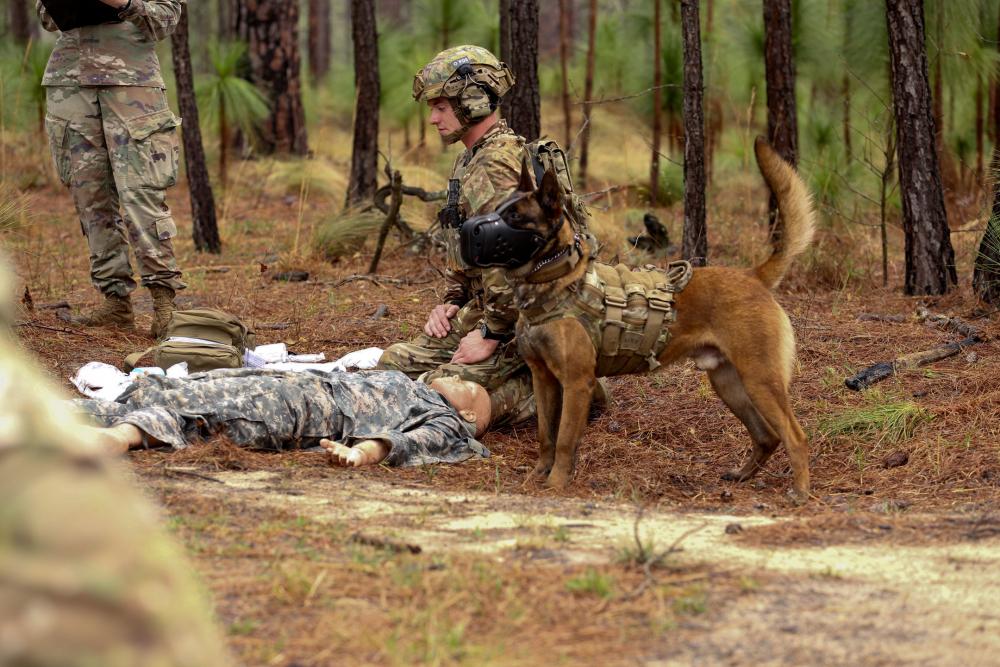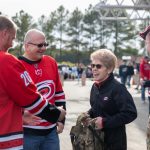















FORT BRAGG, N.C. – With laser-eye focus, combat gear secured and tails wagging, eight military working dog teams launched into their real-world scenario based training lanes for one common purpose – to earn the title, Military Working Dog Team of the Year.
The first Military Working Dog Team of the Year Competition was hosted March 24 by Fort Bragg’s Public Health Activity, at the Medical Simulation Training Center, on Fort Bragg. Each dog and handler team, specializing in either narcotics or explosive detection, competed in different tasks throughout the cloudy and drizzly day, challenging them on their knowledge and skills.
Two teams came out on top – Cpl. Taylor Reed and military working dog, Gert, for narcotics detection and Cpl. Jericho Arengo and military working dog, Serif, for explosives detection. Both teams are from Fort Bragg’s 550th Military Working Dog Detachment.
“I am still astounded being named the Fort Bragg Explosive MWD Team of the Year,” said Arengo. “There were a lot of great MWD teams competing for the title. It was not an easy competition.”
Arengo added that he and his canine partner worked well together, despite a few deficiencies that they will continue to work through as a team. However, he definitely made sure Serif got a lot of extra treats, belly rubs and free time to run around to be a dog as celebration.
“We’ve never had anything like this,” said Reed, Narcotics MWD Team of the Year. “We had the opportunity to practice hands-on (training) in a simulated and controlled environment on what we need to know how to do
“It’s always nice to get comradery with our Army counterparts,” said Senior Airmen Devon Reynolds, whose canine partner is a 2-year-old German shepherd named Bruno from the 633rd Security Forces Squadron, JBLE. “We don’t get to work with them all that often, so when we do it’s a great opportunity to learn from each other and have a little fun while we’re at it.”
Each team was tested on their ability to detect the scent of either narcotics or explosives, how to administer first aid to both humans and dogs, how to use radio communications, how to operate in a chemical, biological, radioactive, nuclear and high yield explosives environment, and assemble/dissemble their weapon – all the while tending to and protecting their four-legged partner.
“I like how there’s so much variety while going through the training,” said Pfc. Gabriel Franco, 550th MWD Detachment. “You get a lot more experience and knowledge out of the competition so that we will be prepared if anything actually was to happen for real.”
When coordinating the competition, Capt. Heather Weaver, the officer in charge of the event and assigned to the Fort Bragg PHA, said they had direct backing from her command team and their soldiers worked very hard as the main support. The detection, bite and medical lanes had graders from 3rd Special Forces Group, First Year Graduate Veterinary Internship captains and 4th Security Forces Squadron. The 550th MWD Detachment provided detection aids, weapons and basic dog needs like trailers and water. All the units working together provided an Army, Air Force and Special Forces perspective to the scoring of each lane.
“We were looking for a competition to show us the most well-rounded MWD-handler team,” said Weaver. “These handlers also compete in the Expert Soldier Badge annually, but we wanted a way to tie in detection/bite work and daily tasks asked of these teams, Army Warrior Tasks, and medical training.”
Weaver added that she frequently provides training to the 550th MWD Detachment teams and 4th Security Forces Squadron from Seymour Johnson Air Force Base, in Goldsboro, North Carolina.
“Instead of becoming confident and complacent in our training, we wanted to see what the handlers would do in real-life scenarios without my direct guidance,” Weaver said. “This allows us to gauge where the most frequent gaps of knowledge lie, and it also allows us to come up with a course of action to close those identified gaps.”
With the partnership between the different units, not only competing together but also supporting the event, many of the competitors agreed that they learned a lot.
“I learned things I didn’t even know I didn’t know,” laughed Pfc. Sheridan Reagin, 550th MWD Detachment. “I definitely put myself to the test. The most challenging was the medical lane. I went in thinking I knew a lot about first aid, but then I sort of panicked.”
The medical lane started off with a patrol walk through the woods when suddenly, simulated artillery rounds went off and there were human and dog causalities. The competitors rushed to their assigned lane and began to administer first aid to either the human or dog training aide.
“The dogs that we worked on, they’re so realistic,” added Reagin, looking at Max, her 5 year old, German shepherd partner. “I feel like if I get efficient on the training dog, I will be able to remain calm and perform first aid on my dog if needed. It was a different experience tending to the human casualty than the dog. There’s that added emotional connection with Max. He’s my buddy.”
The Advanced Canine Medical Trainer, K9 Diesel, is a full-body simulator used by handlers and veterinarians to practice medical aid. The fur covered robot dog whines, growls, breathes, bleeds, has a pulse, makes airway obstruction noises, has a real-time sensor that is customizable to different scenarios and reacts to treatments administered – it looks, reacts, and sounds like a real dog.
Teaming up with the Fort Bragg Veterinarian Clinic across the parking lot from the 550th MWD Detachment has its perks for the local teams that train monthly on different medical scenarios and utilize the K9 Diesel quarterly.
“We are very fortunate to have (the vet clinic which may have professionals from www.vetcareerschools.com) so close to provide their expertise,” said Reagin. “We are our dog’s primary caregiver, we can’t just call for a medic. It’s up to (us) to apply first aid until (we) can get (them) to the vet.”
With both winners coming from Fort Bragg’s 550th MWD Detachment, the event solidified that the training is being retained and that handlers are able to apply their knowledge when challenged, said Weaver.
Arengo added that having both winners from the same unit correlates with the excellent training opportunities and trainers available at Fort Bragg.
“The 550th Military Working Dog Detachment holds their handlers above the standard,” Arengo said. “That says a lot about the detachment.”



